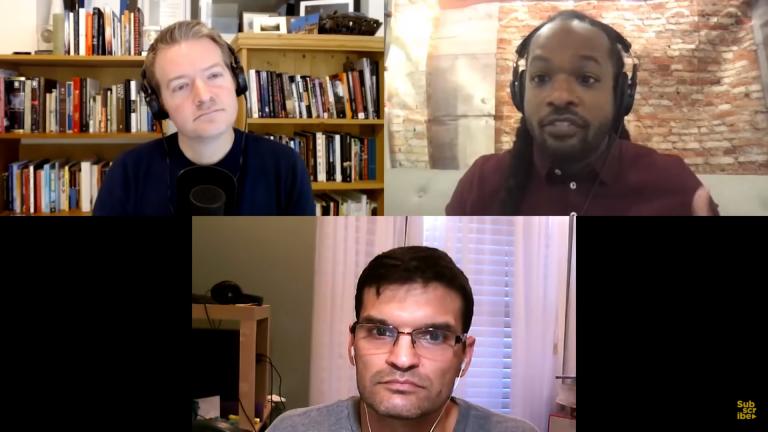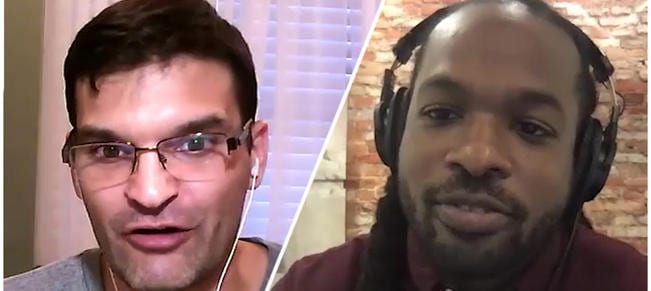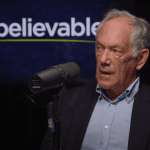 Critical Race Theory (CRT) is viewed by many as a controversial way of understanding racism through the dynamics of oppressed and oppressor groups. Unbelievable? addressed this important topic by featuring a fascinating discussion between the theoretical chemist, apologist and homeschooler Neil Shenvi and Rasool Berry, teaching pastor at The Bridge Church in New York city.
Critical Race Theory (CRT) is viewed by many as a controversial way of understanding racism through the dynamics of oppressed and oppressor groups. Unbelievable? addressed this important topic by featuring a fascinating discussion between the theoretical chemist, apologist and homeschooler Neil Shenvi and Rasool Berry, teaching pastor at The Bridge Church in New York city.
Shenvi believes that CRT is a dangerous worldview that is at odds with the gospel and is increasingly being embraced in evangelical circles. Berry, on the other hand, believes that Christians are overreacting to CRT and, while not adopting it wholesale, believes it can help Christians in the pursuit of reconciliation and justice.
Cruising Altitude or Touching Down
The dialogue between Shenvi and Berry came as refreshing counterpoint to the highly charged rhetoric that often accompanies the debate over CRT. Both agreed that racism is a problem but differed over the role of CRT in facilitating change. Berry believes it is valuable because it highlights the history of racism and helps identify its lingering effects, while Shenvi is concerned it is becoming a dominant cultural metanarrative that is making its way into the church and transforming the gospel. Berry doesn’t want us to forget the particulars of the past, while Shenvi worries about the havoc it will bring to the future.
Their different perspectives were brought to light by the way they defined CRT. Shenvi defined Critical Race Theory as more of a pervasive worldview:
“The central tenets of Critical Race Theory according to Yosso are first, racism is permanent, pervasive and normal. Racial oppression has not disappeared, it has just evolved. Second, racism, sexism, classism, heterosexism etc are all inextricably linked forms of oppression that must be fought simultaneously. Third, claims of objectivity, neutrality, universality, meritocracy, and colorblindness are mechanisms to disguise racism and oppression, they conceal actual racism. Finally, the experiential knowledge or lived experience of people of color is critical to understanding racism. One of the ways that racism operates is by suppressing what’s called the epistemologies of people of color, how they know the truth, and we need to recover that by listening to their narratives.”
Berry, however, defined it in narrower terms as an academic discipline devoted to the study of the reasons, ramifications and responses to racism:
“One definition I found helpful on Purdue University’s site was CRT is a theoretical and interpretive mode that examines the appearance of race and racism across dominant cultural modes of expression. In adopting this approach, the CRT scholars attempt to understand how victims of systemic racism are affected by cultural perceptions of race and how they are able to represent themselves to counter prejudice.”
Shenvi views the problem from a cruising altitude of 30,000 feet while Berry is more interested in touching down. Shenvi wants to fly high and see how CRT is reshaping the cultural landscape while Berry wants to understand the difference it makes when the rubber actually hits the road.
Supersizing the Narrative
Berry defends his interest in CRT by appealing to the common grace God affords us all. He points out that believer and unbeliever alike are able to discern pieces of truth and we do a disservice to our fellow man if we don’t listen to their concerns. He offered the analogy of eating meat and spitting out the bones, taking what is useful and discarding that which is harmful. Shenvi pointed out that separating bone and meat is more difficult than Berry believes, because some of the meat is going bad and the church is already showing symptoms of spiritual indigestion.
I share Berry’s passion for listening to disparate voices in order to be more informed, but I also recognize Shenvi’s concern that even a little bit of unnoticed leaven can dramatically alter the bread of life. Humans are notorious for creating inappropriate metanarratives. Darwin’s theory is a prime example. It went from a theory designed to explain the diversity of life to a grand story that interprets everything from economics to psychology, anthropology to law.
While I admire the knowledge afforded to everyone by common grace, I get concerned when it is cherry-picked and transformed into the ‘special’ revelation of a select few who then use it to make others conform. Sadly, humans are not very good at recognizing truth and often end up incorporating falsehoods into their worldview and supersizing them to God-like proportions.
Ethics or Epistemology
Shenvi worries that Critical Race Theorists don’t stay in their own lane but embrace intersectionality and expand their theory to explain categories other than race. I think he fears that Critical Race Theory is a gateway drug to Critical Theory and the church is drinking the Kool-Aid:
“I can quote many Critical Race Theorists saying this is a core tenet of the theory, but they connect racism, sexism, classism and heterosexism as all linked forms of oppression, the term they use is interlocking systems of oppression. That’s an extremely central idea…Ibram Kendi, the author of, How to be an Anti-Racist, says to be anti-racist is to be a feminist, to be truly a feminist is to be anti-racist. We cannot be anti-racist if we are homophobic or transphobic.”
Berry recognizes the problem with CRT as a totalizing metanarrative but doesn’t want to miss the realities from which it arose. He said on the show that CRT is actually late to the party because these issues had already been raised by prominent historical African-American figures such as Frederick Douglass, Sojourner Truth, Harriet Tubman, and Richard Allen. He doesn’t want CRT to be a distraction but feels that it is an appropriate vehicle to raise people’s awareness. Berry, while recognizing the potential dangers of CRT, also points out that Christians who embrace some of the truths found in it are often labeled as heretics which prevents important discussions about racism from taking place in the Church.

Berry wants CRT to stimulate a conversation about the reality of racism but believes that when it becomes a theoretical discussion about epistemology it misses the far more important ethical questions. He doesn’t want us to be distracted by abstract principles when individual lives and relationships are at stake:
“The Church is being brought ethical concerns and is responding with epistemological critique… Dr. Carl Ellis, who’s an incredible mentor, wrote a book, Free at Last, where he talks about side A and Side B of the gospel. Side A is about epistemological concerns and side B the ethical concerns. Ultimately, people in positions of power oftentimes are more focused on the epistemological than the ethical.”
Why is the Church so hesitant to embrace it?
If CRT is such a good starting point for a discussion on race, why are so many Christians resistant to its message? I think one of the problems is the language used by CRT. Oppressor and oppressed are terms of violence and I think the average Christian doesn’t believe they have oppressed anyone.
True oppression is a historical reality and vestiges of it still remain, resulting in ongoing inequalities. As Berry said on the show: “What was once codified legally remains as the vestigial ideas and narratives of those systems.” Unfortunately, CRT has taken a page from the postmodern playbook by changing the meaning of words to make its case.
Postmodernism equates love with tolerance so that when we don’t tolerate all lifestyles we are called haters. It equates truth with preference and thereby makes it a serious offense to question someone’s opinion. Similarly, it equates disadvantage with oppression and transforms all inequalities to acts of oppression. I think the average Christian would be much more likely to engage in constructive dialogue if they weren’t called a racist, hater or oppressor.
I think it is fair to say that most people recognize that privilege is afforded to dominant groups but the solution isn’t expanding victimhood but maximizing opportunities. Interestingly, immigrants came to America knowing that they would be a minority and they did so not to increase the victim demographic but to take advantage of the land of opportunity. I think for many the problem with CRT is that it emphasizes “misery loves company” rather than “we shall overcome”.
The Bible Tells Me So
One of the tenets of CRT is that the only people whose opinions are valid are those who are oppressed. While it is true that we cannot completely understand what it is like to be in another person’s shoes, it feeds into the postmodern idea that all truth is relative and is based only on personal experience and feelings. It creates a problem for a gospel that is meant to apply to all people. Shenvi summarizes the situation:
“The ultimate authority is not our lived experience. It’s scripture and what’s more, because of the perspicuity of Scripture, all people from all social locations can interpret it. Should we listen to other people? Absolutely. Should we go outside of our tradition and ask what are they saying about scripture? Is it true? Absolutely. We shouldn’t just try to find commentators and theologies that are non-white, we should try to find doctrines and commentaries that are actually true, because they comport with Scripture.”
While we differ in our cultural experiences, we are all united by being equally oppressed by sin. It was this common bond that broke down barriers between Jew and Gentile, male and female, slave and free and then united them in Christ.
The early Christian Church was oppressed and marginalized, but it considered it pure joy when it met trials. They didn’t picket and march but became good citizens, cared for the sick of their persecutors and prayed for their enemies. Instead of hunkering down in Christian silos they went to the ends of the earth to unify peoples from every nation, culture and ethnicity in order to increase the diversity of the Kingdom to come. In a letter written in 177 A.D. to the emperor Marcus Aurelius, the Christian philosopher Athenagoras described the way in which Christians behaved despite the threat of persecution:
“When struck they do not strike back; when robbed, they do not sue; to those who ask, they give and they love their neighbors as themselves. If we did not think that a God ruled over the human race, would we live in such purity? The idea is impossible. But since we are persuaded that we must give an account of all our life here to God who made us and the world, we adopt a temperate, generous and despised way of life.”
The Difference Jesus Makes
Jesus came to the outsider, the oppressed and the broken but rather than giving them money, jobs or homes, he offered them forgiveness. He seemed to be less concerned with the injustice of the state and more concerned with the oppression of sin. Jesus cared about social justice but knew that it could only come about once we had effectively dealt with our sin problem. Jesus recognized that persecution was inevitable but told his followers that rather than being a barrier to social justice it was a door to a Kingdom of ultimate justice where the last would be first.
“Blessed are you when people insult you and falsely say all kinds of evil against you because of me. Rejoice and be glad, because great is your reward in heaven .” (Matthew 5:11-12)
Jesus makes for a very poor liberator by worldly standards because he calls us to turn the other cheek, walk the extra mile, and pray for our enemies. He doesn’t excuse us from trying to make this world a better place, since our prayers must always include petitions for God’s will be done on earth as it is in heaven, but He calls us to do it by loving God and loving neighbor, and Jesus makes it quite clear that our neighbor is not our buddy down the street but the outsider that the in-group discriminates against. It is only when we bring sacrificial agape love to our fellow image-bearers that we will bring inequality to an end.












